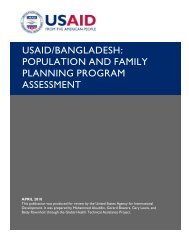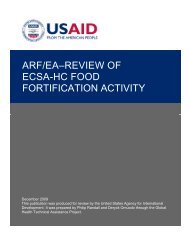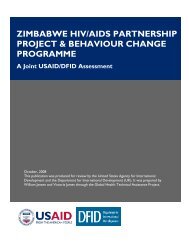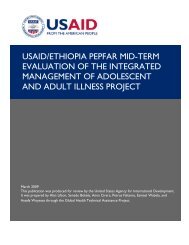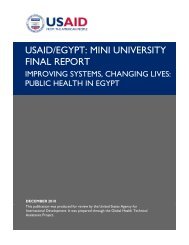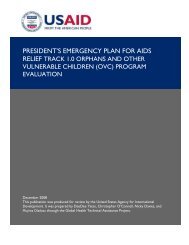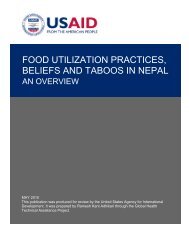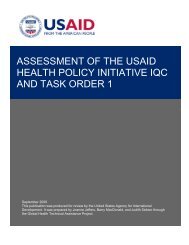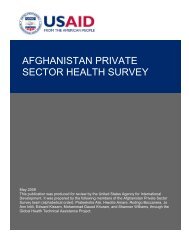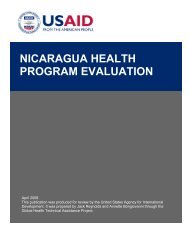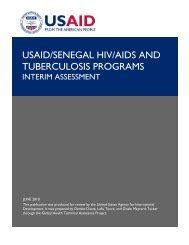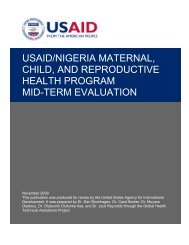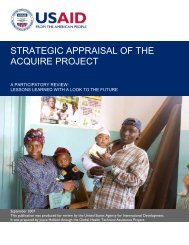Evaluation of the Tuberculosis Control Assistance Program (TB CAP)
Evaluation of the Tuberculosis Control Assistance Program (TB CAP)
Evaluation of the Tuberculosis Control Assistance Program (TB CAP)
Create successful ePaper yourself
Turn your PDF publications into a flip-book with our unique Google optimized e-Paper software.
The <strong>TB</strong> <strong>CAP</strong> CTO seems to have provided helpful, beneficial, direct oversight and not obstructedprogress with unexpected requests. Several interviewees commented that <strong>the</strong> CTO rapidly intervenedupon request and effectively removed obstacles, such as when delays occurred at Missions.Several interviewees had a perception that <strong>the</strong> line between KNCV and <strong>the</strong> PMU was occasionallyblurred and that <strong>the</strong> PMU did not always support <strong>the</strong> interests <strong>of</strong> all partners equally, although no clearevidence was found to support this.What <strong>the</strong> PMU does to ensure effective, appropriate workplan development is unclear. Some workplansincluded activities that seemed unrealistic given <strong>the</strong> workplan timeframe. There are debilitating delays in<strong>the</strong> process <strong>of</strong> drafting and approving country workplans. These delays do not seem to be <strong>the</strong> result <strong>of</strong>bottlenecks in <strong>the</strong> PMU, and <strong>the</strong> PMU seems to react quickly to address <strong>the</strong>m, but it does not seem tohave a system for routinely monitoring <strong>the</strong> steps in workplan development and approval against expectedlead times in order to identify and address such delays before <strong>the</strong>y become critical.RecommendationsThe PMU should clarify its role in <strong>the</strong> development <strong>of</strong> workplans and consistently adhere to <strong>the</strong>definition. If it is to be responsible for pre-planning workplans before a coordinating partner isselected, this should always be <strong>the</strong> case, and potential coordinating partners should not be involved. Ifit is to be responsible for ensuring <strong>the</strong> technical quality and strategic relevance <strong>of</strong> workplans, this tooshould be done consistently, and <strong>the</strong> criteria should be clearly communicated to partners in advance.If it is to delegate all responsibility for workplan preparation, it should not participate at all andinstead should consistently seek partners to conduct this work.The PMU should establish a system for registering potential new core and country projects in a Webbasedsystem accessible to all partners and set out a standardized process for workplan development,approval, and implementation. It should also take responsibility for updating this system with <strong>the</strong>dates when events occur, so that it will be possible to quickly and easily identify projects at differentstages <strong>of</strong> development and flag those that may need intervention. Such a process would also facilitategeneral reporting and, if financial details were included, make financial tracking more accurate andtimely. There are several Web-based procurement systems upon which to model such a system.Financial ManagementAlthough <strong>the</strong> financial management <strong>of</strong> <strong>TB</strong> <strong>CAP</strong> was reviewed, a formal detailed audit was considered notto be within <strong>the</strong> scope <strong>of</strong> <strong>the</strong> evaluation. Based on <strong>the</strong> first two annual independent audits <strong>of</strong> <strong>TB</strong> <strong>CAP</strong> (athird audit is pending), however, it appears that KNCV has fairly represented its work in its <strong>of</strong>ficialannual financial statement to USAID and its cost-share statement, and is compliant with <strong>the</strong> financialrequirements in <strong>the</strong> KNCV/USAID cooperative agreements. The auditors noted no matters involvingfinancial control and operation that <strong>the</strong>y considered to be material weaknesses. Fur<strong>the</strong>rmore, KNCVseems to have responded to many <strong>of</strong> <strong>the</strong> changes suggested by <strong>the</strong> auditors and indicating a readiness toimprove performance even when improvements were not mandatory.The cooperative agreement between USAID and <strong>TB</strong> <strong>CAP</strong> has a 17.8% cost share over <strong>the</strong> course <strong>of</strong> <strong>the</strong>entire project. In <strong>the</strong> first three years <strong>of</strong> <strong>TB</strong> <strong>CAP</strong>, <strong>the</strong> cost share far exceeded this (approximately 50%).However, <strong>the</strong> bulk <strong>of</strong> it is provided by a subset <strong>of</strong> partners.The PMU maintains a stockpile <strong>of</strong> money (similar to a vaccine buffer stock) from which it reimbursespartners upon request. It <strong>the</strong>n requests USAID/ Washington to replenish <strong>the</strong> stock. The amount <strong>of</strong>financing required at any given time, however, is not based on any systematic planning <strong>of</strong> expected futurepayments to be made. As a result, <strong>the</strong> stockpile has at times been higher than <strong>the</strong> amount planned(US$500,000 minimum).10 EVALUATION OF THE TUBERCULOSIS CONTROL ASSISTANCE PROGRAM (<strong>TB</strong> <strong>CAP</strong>)



